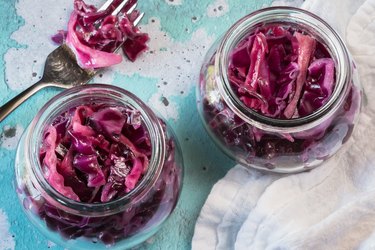
The salty taste of pickled vegetables — most commonly cucumbers, though there are other options — is popular among even picky eaters. The practice of fermented foods for preservation has been around for thousands of years, and many pickled vegetables' benefits for health are still relevant today.
Tip
No, pickling vegetables doesn’t remove nutrients, though it does add sodium. The practice helps preserve fresh, nutritious vegetables for times when they otherwise wouldn’t be available.
Video of the Day
All About Pickling Vegetables
The next time you pop open a jar of pickles, stop to think about the fact that the practice of pickling has been around for about 4,000 years, according to the Massachusetts Department of Agricultural Resources (Mass DAR).
Video of the Day
This was how ancient people preserved fresh produce, back before options like canning and freezing were available. Pickled vegetables had benefits such as a long shelf life through the winter or during long journeys when food would be apt to spoil.
Pickling remains a popular practice today, and people are opting to consume pickled vegetables for benefits above and beyond their long shelf life.
Yes, it's nice that they make out-of-season vegetables easy to store and available all year long — Harvard Medical School gives the example of cabbage, which would spoil pretty quickly if left out on a shelf in its natural form, but when it's pickled in the form of sauerkraut, it will last for months.
What's more, Mass DAR explains, pickling does not require vegetables to be completely sterile, such as the way canning does, before the vegetables are preserved.
Thanks to recent regulations by the Food and Drug Administration, according to the U.S. Department of Agriculture, there is a decreased risk of bacterial contamination in commercially distributed pickled vegetables. In fact, there have not been any cases of illness from food-borne pickle contamination in 50 years.
Pickled Vegetables Have Benefits
If you take a look at the nutritional profile of the most popularly pickled vegetable — the cucumber — you see it stays mostly the same in fresh and pickled form.
A cup of sliced cucumber has 16 calories, mostly from 3.8 grams of carbohydrates, including a half-gram of fiber and 1.7 grams of sugar. It even a small source of calcium, potassium, magnesium, vitamin C and vitamin K.
On the other hand, a cup of dill pickles has 19 calories with only 3.7 grams of carbohydrates, 1.7 of which is sugar and 1.6 of which is fiber.
The pickle has the same calcium, potassium, magnesium, vitamin C and vitamin K as a cucumber, but it has 1,254 milligrams of sodium, whereas the cucumber has essentially none. This sodium comes from the salt that is commonly added, as Mass DAR points out, when vegetables are pickled in brine or vinegar.
Vegetables not only retain their vitamins and minerals when they are pickled but also gain a few extra benefits. In addition to increased shelf life, pickled foods deliver a punch of probiotics, live microorganisms that are good for your digestion.
As Harvard Medical School explains, having these beneficial bacteria in your gut will help your immune system and prevent inflammation. Fermented vegetables also have vitamin B12, which isn't otherwise found in plant foods.
More Than Just Cucumbers
Don't think pickles are limited solely to cucumbers. You can pickle green beans, onions, cabbage, cauliflower, carrots, beets, celery, olives and okra, extending the shelf life of all these vegetables.
For example, the vegetable okra — which can typically be kept in the fridge for two or three days, according to Eat Fresh — can last for much longer, and a person can enjoy the benefits of eating okra every day.
Okra's nutritional benefits include vitamin E for good eyesight and immunity, B vitamins for cell growth, vitamin C for immunity, vitamin K for healing, fiber for healthy digestion and folate for tissue growth. The benefits of eating okra every day don't simply end when okra is out of season.
Even though many vegetables are available year-round in a typical grocery store, pickling is a great way to enjoy out-of-season produce. Now you can enjoy the salty taste of pickles or the benefits of eating okra every day no matter what time of year or what part of the world you're in.